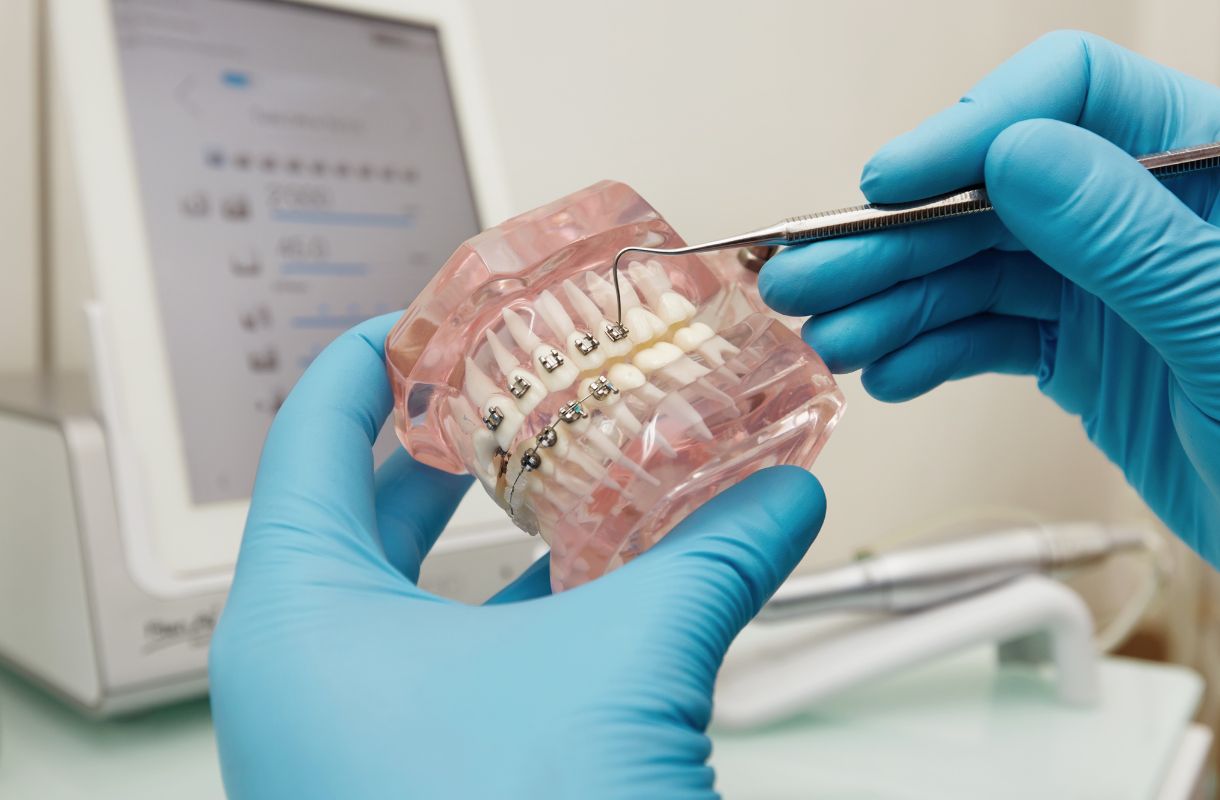What Exactly are
Dental Bridges?
A dental bridge is a prosthetic device used to fill the gap created by one or more missing teeth. It consists of one or more artificial teeth, known as pontics, which are anchored to the adjacent natural teeth or implants. Bridges not only restore the appearance of your smile but also improve functionality, allowing for better chewing and speaking.
Types of Dental Bridges
There are several types of dental bridges, each designed to meet specific patient needs:
1. Traditional Dental Bridges
Traditional bridges are the most common type and involve creating crowns for the teeth on either side of the gap. These crowns support the pontic in the middle.
- Material: Traditional bridges can be made from various materials, including porcelain, ceramic, or metal, depending on aesthetic and functional requirements.
- Best For: They are ideal when there are healthy teeth on both sides of the missing tooth or teeth.
2. Cantilever Bridges
Cantilever bridges are used when there is only one adjacent tooth next to the gap. The pontic is anchored to the single supporting tooth.
- Advantages: This type is beneficial in situations where there is not enough space for a traditional bridge or when the adjacent tooth is not strong enough to support a full bridge.
- Considerations: Cantilever bridges may place more stress on the supporting tooth, which can lead to complications over time.
3. Maryland Bridges
Maryland bridges, also known as resin-bonded bridges, consist of a pontic held in place by metal or porcelain wings that are bonded to the back of the adjacent teeth.
- Minimal Tooth Preparation: This type requires less alteration of the supporting teeth, making it a less invasive option.
- Ideal For: Maryland bridges are often used in the front of the mouth where aesthetic appearance is crucial.
4. Implant-Supported Bridges
For patients missing multiple teeth, implant-supported bridges provide a stable solution. These bridges are anchored to dental implants rather than natural teeth.
- Stability: This type offers enhanced stability and longevity, as implants integrate with the jawbone.
- Best For: Ideal for patients with significant tooth loss who may not have enough healthy teeth to support a traditional bridge.
Benefits of Dental Bridges
Dental bridges offer numerous advantages:
- Restoration of Functionality: They restore the ability to chew and speak properly, which can be affected by missing teeth.
- Aesthetic Improvement: Bridges enhance the appearance of your smile, filling gaps and providing a natural look.
- Preventing Teeth Shifting: By filling the gap, bridges help prevent adjacent teeth from shifting out of position, which can lead to further dental issues.
- Support for Facial Structure: Missing teeth can lead to changes in facial structure; bridges help maintain the shape of your face.
The Dental Bridge Procedure
The dental bridge procedure step by step typically involves:
1. Initial Consultation
During the first visit, the dentist will evaluate your oral health, take X-rays, and discuss your options. This assessment helps determine the most suitable type of bridge for your needs.
2. Tooth Preparation
If opting for a traditional or cantilever bridge, the adjacent teeth will be prepared by removing a portion of enamel to accommodate crowns. This process usually requires local anesthesia for comfort.
3. Impressions
After tooth preparation, impressions of your teeth will be taken to create a custom bridge that fits perfectly in your mouth. This may involve using digital scanning technology for greater accuracy.
4. Temporary Bridge
While your permanent bridge is being fabricated, a temporary bridge may be placed to protect the prepared teeth and maintain aesthetics.
5. Final Placement
Once the permanent bridge is ready, you will return to the dentist for its placement. The dentist will ensure a proper fit and make any necessary adjustments before permanently cementing the bridge in place.
Cost of Dental Bridges
The cost of dental bridges in India can vary depending on several factors:
- 6 tooth dental bridge cost: Typically ranges from ₹30,000 to ₹90,000 in India.
- 3 tooth dental bridge cost: Usually between ₹15,000 to ₹45,000.
- 4 teeth dental bridge cost: Can range from ₹20,000 to ₹60,000.
- 2 tooth dental bridge cost: Generally between ₹10,000 to ₹30,000.
- 5 tooth dental bridge cost: Typically ranges from ₹25,000 to ₹75,000.
The dental bridge cost in Hyderabad may vary slightly from these averages depending on the clinic and materials used. For those seeking premium options, zirconia teeth price in Hyderabad is generally higher, ranging from ₹20,000 to ₹40,000 per tooth, but offers superior aesthetics and durability.
Aftercare for Dental Bridges
Proper care is essential to ensure the longevity of your dental bridge:
- Oral Hygiene: Maintain good oral hygiene by brushing twice a day and flossing daily. Special floss threaders or interdental brushes can help clean around the bridge.
- Regular Dental Check-ups: Schedule regular visits to your dentist for professional cleanings and check-ups to monitor the health of your bridge and surrounding teeth.
- Dietary Considerations: Avoid hard or sticky foods that could dislodge or damage the bridge.
- Avoid Tobacco: Smoking can affect oral health and the longevity of dental restorations. Quitting or reducing tobacco use can improve overall dental outcomes.
Potential Risks and Considerations
While dental bridges are generally safe and effective, there are some risks to consider:
- Sensitivity: Some patients may experience sensitivity in the adjacent teeth after the procedure, which usually subsides over time.
- Decay: The supporting teeth may still be susceptible to decay. Regular dental care is crucial to prevent issues.
- Bridge Failure: If not properly maintained, bridges can become loose or damaged, necessitating repairs or replacement.
It’s important to discuss these factors with your dentist to determine the best option for your specific needs and budget. Remember that investing in quality dental work can lead to better long-term outcomes and potentially lower costs over time.
FAQs
How long do dental bridges last?
With proper care and regular dental check-ups, dental bridges can last anywhere from 5 to 15 years or more, depending on the material and oral hygiene.
Can dental bridges affect speech?
Temporary speech changes may occur as the mouth adjusts to the new structure, but these typically resolve as you become accustomed to the bridge.
How is a dental bridge attached?
A dental bridge is typically attached by cementing crowns onto the natural teeth adjacent to the gap, with a pontic (false tooth) filling the space.
Do dental bridges require special care?
While dental bridges do not require special care beyond regular brushing and flossing, it is essential to clean under the pontic using floss threaders to prevent plaque buildup.
Are there any dietary restrictions with dental bridges?
Initially, it may be advisable to avoid very hard or sticky foods to prevent damage to the bridge, but normal eating habits can typically resume once you adjust.
General Dentistry
Get In Touch With Us
Call us
+91 9676100045 - Punjagutta
+91 7702425551 - Hitech City
+91 7702425551 - Hitech City
Email us
reception@smiline.com
Book An Appointment
Book a visit to Smiline, simply fill out the form below and we will contact you back regarding the intervention you require.



